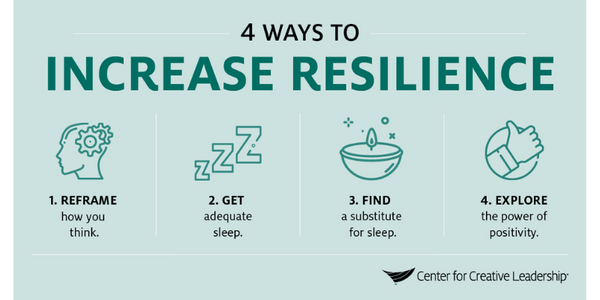Being able to increase your resiliency is necessary in today’s uncertain and volatile managerial world. The question is how can you develop it? Here are 4 Strategies you can use.
By Marian Ruderman at the Center for Creative Leadership (CCL)
A common myth is that the way to deal with the pressures of middle and senior management is to work harder. We like to think that extending work hours and multi-tasking are ways to be more effective at work. The truth is, this thinking is flawed. We know from studies of stress, that performance does not always increase as a result of putting more pressure on yourself. Initially, additional pressure might lead to improvements in performance, but then performance levels off and ultimately may decline as the pressures associated with work increase.
When the pressures of being in the middle of an organization and working exceptionally hard result in stress, it is time to think about developing resiliency, the ability to bounce back from obstacles and setbacks. Too much pressure or stress results in narrowed thinking, increasing the likelihood of flawed reasoning. It also turns on the stress response in the body, releasing a tsunami of chemicals and hormones.
Being able to increase your resiliency is necessary in today’s uncertain and volatile managerial world. The question is how can you develop it? As a first step, it is helpful to identify those situations in which you feel overly pressured. What triggers those feelings? Once you are more attuned to what produces stress and feelings of pressure, you can then work on ways to build a reserve of resiliency. There are many strategies you can use.

Reframe how you think. One of the most helpful tools is to think about how to reframe a situation. This is where knowing what triggers your feelings of stress is helpful. When you get that feeling in your gut that you are overloaded, threatened, or in conflict, think about other ways to characterize the situation. Reframing requires examining a situation from a different perspective and asking what else could be going on. For example, if a valued staff member resigns, you might focus on the loss, or you can choose to reframe it as a chance to hire new talent. There are some basic questions you can ask yourself: How could I benefit from this situation? and What might my interpretation of the situation be missing? The CCL Leadership Development Program offers an opportunity to rethink your situation at work and to consider alternative perspectives on both your situation and your response to them.
Get some sleep. We all know that sleep offers numerous benefits but many in leadership positions are willing to sacrifice some sleep to get more work done. Sleep is important because it allows the brain to go from taking in new inputs to encoding, processing, and integrating the day’s experience in a way that makes it available for future use. It is a built-in biological source of resilience that many leaders do not take full advantage of. Adequate sleep can result in enhancements to attention and creativity; two capacities needed in positions of leadership.
Find a substitute for sleep. Sometimes in this 24/7 world, it is just impossible to get the right level of sleep. If you just can’t do it, then take a restorative break during the day. For example, a short nap, a walk, a yoga break, or a break to meditate can help. These practices take your attention away from the specific situation and give your mind a chance to move past stressful thoughts.
Explore the power of positivity. Research by Barbara Fredrickson and others has demonstrated that positivity helps people recover from setbacks. Positivity is a broad term to cover many positive emotions including love, joy, appreciation, hope, serenity, and amusement. Fredrickson and others have found that when people are in positive states of mind, they think more broadly than when they are in negative states of mind. Savor your feelings of positivity so that they last. One way to do this is to keep a gratitude journal, where you note on a daily basis the 3-5 things you are most grateful for. This exercise can help you to look for the good in a situation. Positive emotions can build sources of resiliency that you can have in reserve when facing adversity at work.
Resiliency is needed not just at work, but also in our personal lives. Having this sort of inner strength is helpful for all that life can throw at you: divorce, losses, illnesses, and accidents. Resiliency gives you the strength to bounce back and be at your best.
What strategies do you use to enhance your resiliency?
Originally posted in CCL’s LeadingEffectively.com Blog. Eckerd College has been a network associate of CCL since 1981.




